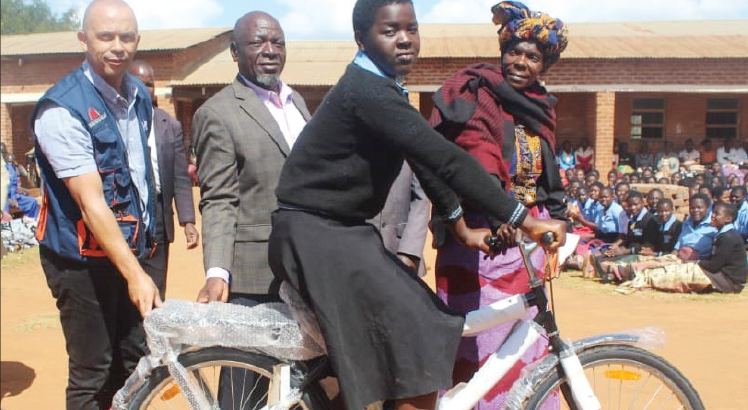Girls biking to school
Jinesi Chinseswa, from Kaponda Village in Lilongwe, learns at Mlomba Community Day Secondary School n(CDSS), 10 kilometres away.
“I often got to school late and too tired to pay attention in class. I missed a lot each day,” she says.
Her school performance and attendance dropped dramatically due to the long walks such that some of her peers quit school to marry.
Hard choices

Her parents, hand-to-mouth farmers, pressed her to choose between school and marriage.
“It was a hard choice,” she says. “My mother persuaded me to choose marriage because they were struggling to pay my fees and that marriage would provide an income for buying some farm inputs.”
At 17, she married a man with a wife and two children.
“I was waiting for my Form Two examinations results,” Jinesi recalls. “The burden of walking a long distance to school alone and falling performance left me with little hope.”
But she walked free as marriage proved unbearable.
Jinesi mirrors the plight of nearly half of Malawian girls who marry before reaching their 18th birthday, according to the Malawi Demographic and Health Survey of 2015.
In 2018, the Education Management and Information System indicated that about seven percent of schoolgirls had dropped out to marry while five percent fell pregnant.
Most girls from rural areas, where 84 in every 100 Malawians live, are disproportionately at risk of dropping out due to long walks to schools..
In 2021, World Bicycle Relief (WBR) extended the free distribution of bicycles from the Southern Region to the Centre.
This offered some girls outside Malawi’s capital city, Lilongwe, a window of hope.
When Jinesi returned to school, she was among 120 students at Mlomba CDSS who received bicycles last year.
The bicycles have put her future back on the wheels.
“Barely a year on, my decision to go back to school is bearing fruit. The bicycle has improved my school attendance and time spent in class. Interestingly, most girls are dumping their marriages to re-enrol,” she explains.
Lilongwe Central West Education Division manager Joseph Nkhata said absenteeism and sexual attacks are falling as girls now get to school and return home before sunset.
He explains: “Girls’ performance at Mlomba and Mitundu CDSSs has incredibly improved.
“Previously, even those who took shelter in self-boarding facilities close to school were never safe as they had no one to supervise them. Most of them ended up quitting school due to early pregnancies and marriages.”
No girl has dropped out since WBR donated the bicycles.
According to WBR programmes manager Aggie Kolla, WBR has distributed 20 000 Buffalo bicycles nationwide since it rolled out the programme in 2017. The charity has donated over 3 000 of these bicycles across the Central Region this year.
“Apart from Mlomba, learners at Mitundu received 90 bicycles and 2 724 went to rural parts of Kasungu,” she says.
Beyond school blocks
WBR country director Anthony Kinnaird said the no-profit organisation is committed to lessening the travels rural students, especially girls, endure to learn.
“World Bicycle Relief has two tiers: A charitable arm that provides support of bicycles to rural learners for free and another that sells the bikes mainly to businesspeople and farmers,” he explains.
Deputy Minister of Education Monica Chang’anamuno says rural students’ long distances increase girls exposure to risky sexual activities and attacks fuelling absenteeism, dropout rates, child marriages, teen pregnancies and sexually-transmitted infections, including HIV.
“The bicycles from WBR will ease the draining distances learners walked to school to achieve their dreams. Government’s focus has mostly been on building school blocks and providing desks, which were never a solution to all the challenges faced by the rural learners,” she says.





